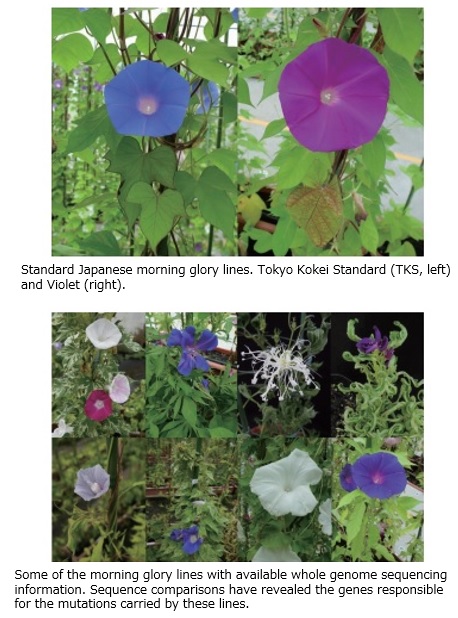

- Core Center:Faculty of Sciences, Kyushu University
- Principal Investigator:Eiji Nitasaka
- FAX:+81-92-802-4330
- Sub-Core Center 2:National Institute for Basic Biology, National Institutes of National Sciences
概要Overview
 The Japanese morning glory (Ipomoea nil) is useful for research purposes because its generation time is less than 3 months and its size can be controlled by manipulating the daylength. Research on this plant is increasing to take advantage of the fact that it is a short-day plant, has vining capabilities and short one-day flowering time. The genome of I. nil is also uniform among lines, making it easy to identify the gene responsible for a mutation. We maintain a variety of I. nil mutants originating in the Edo period, and new mutations can be induced using endogenous transposons.
The Japanese morning glory (Ipomoea nil) is useful for research purposes because its generation time is less than 3 months and its size can be controlled by manipulating the daylength. Research on this plant is increasing to take advantage of the fact that it is a short-day plant, has vining capabilities and short one-day flowering time. The genome of I. nil is also uniform among lines, making it easy to identify the gene responsible for a mutation. We maintain a variety of I. nil mutants originating in the Edo period, and new mutations can be induced using endogenous transposons.
Stock
・Mutant and wild-type lines: about 2,500 lines
・Sibling species lines: about 450 lines
・cDNA clones: about 61,100 clones
・BAC clones: about 115,200 clones
・Petal-specific expression vectors and more
Subjects in the NBRP programs related to “Morning glory”
【 Value addition subprogram/ Genome Information Upgrading Program 】
| FY2020 | Collecting and providing information on genetic variations of 100 Japanese morning glory lines(in Japanese) |

